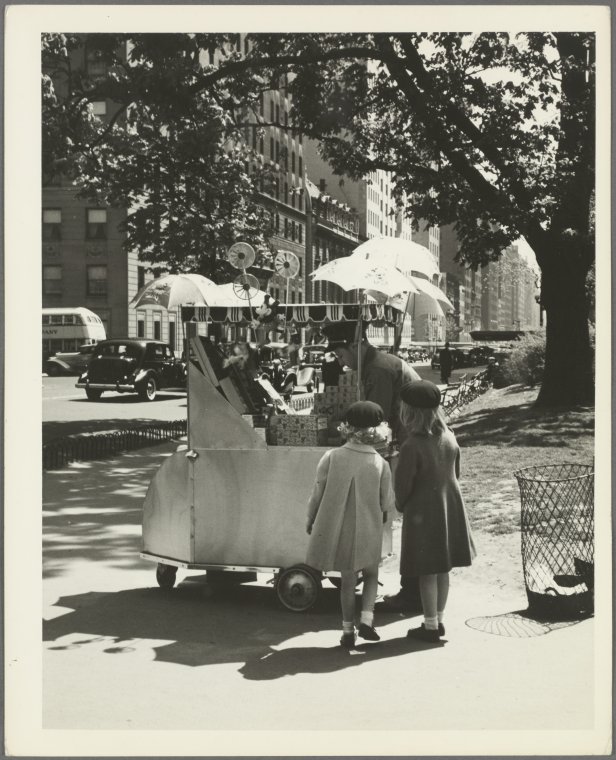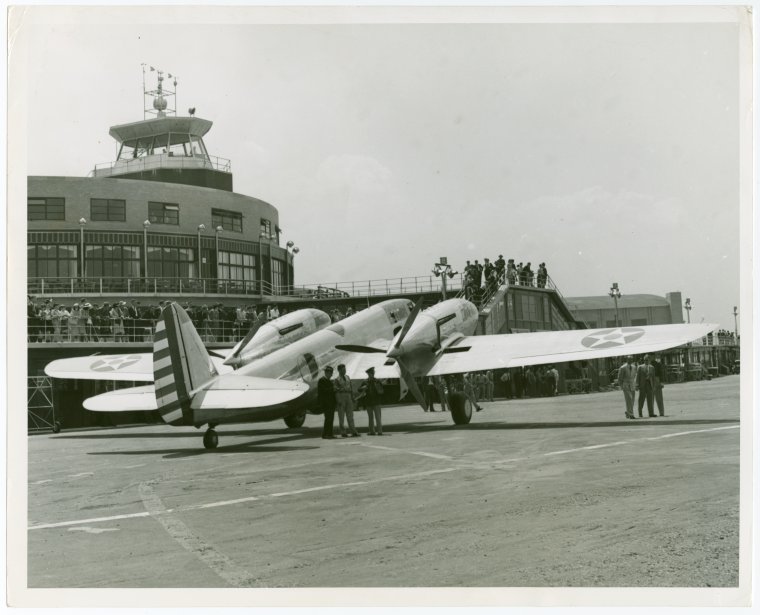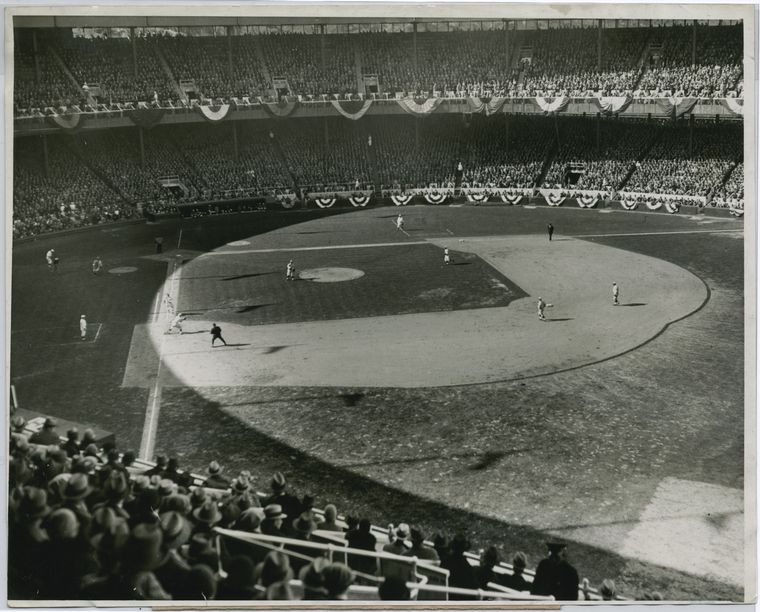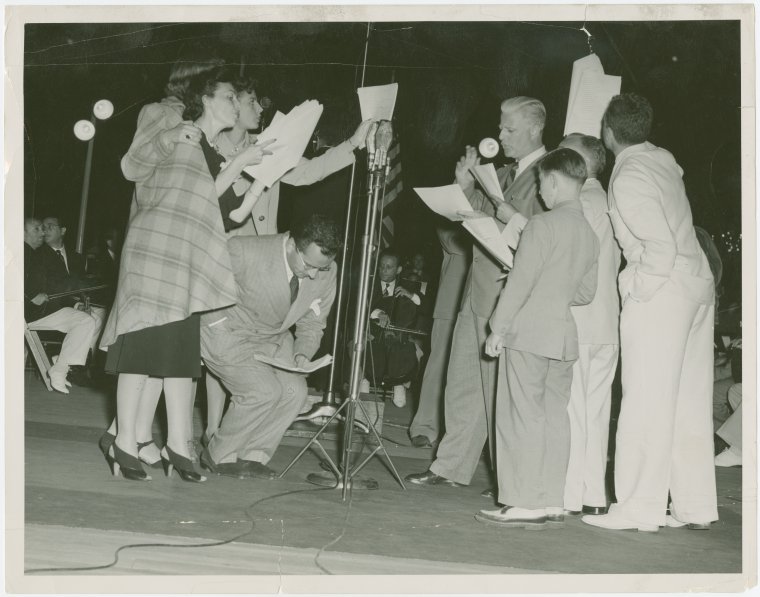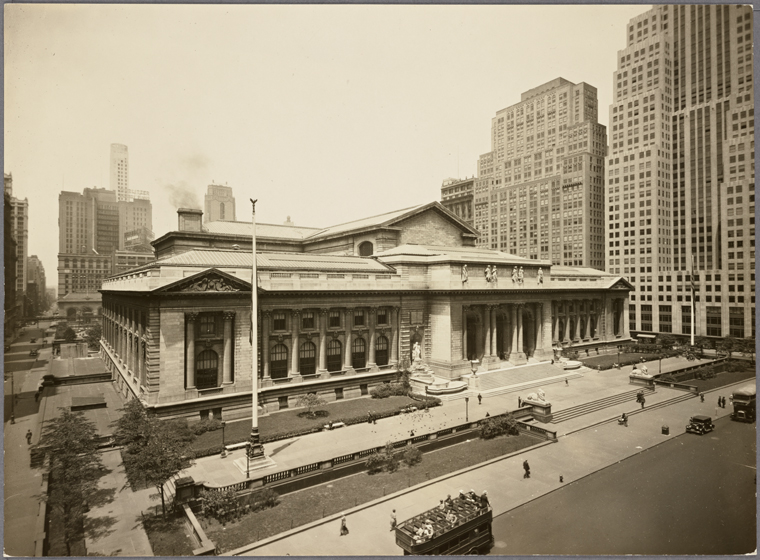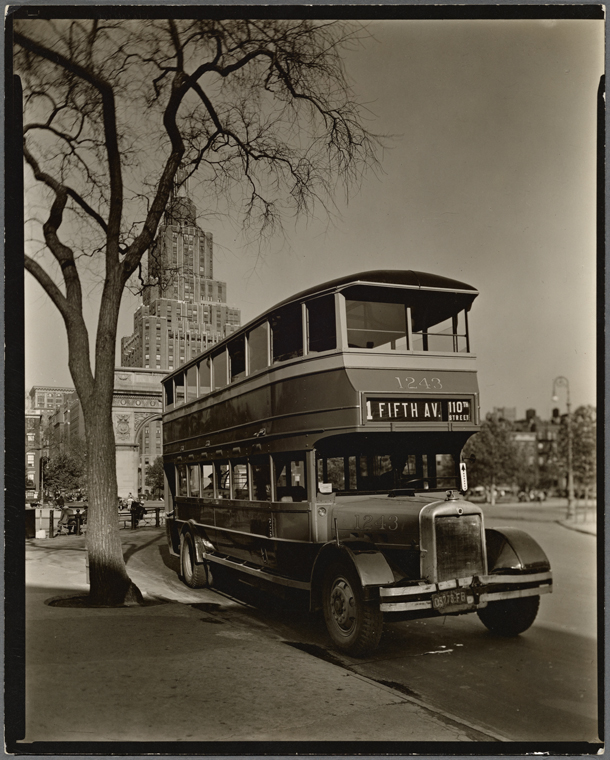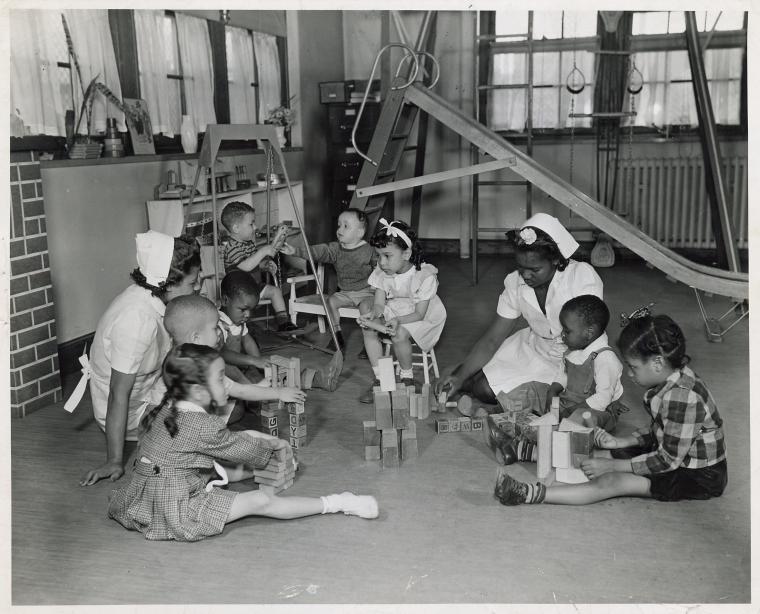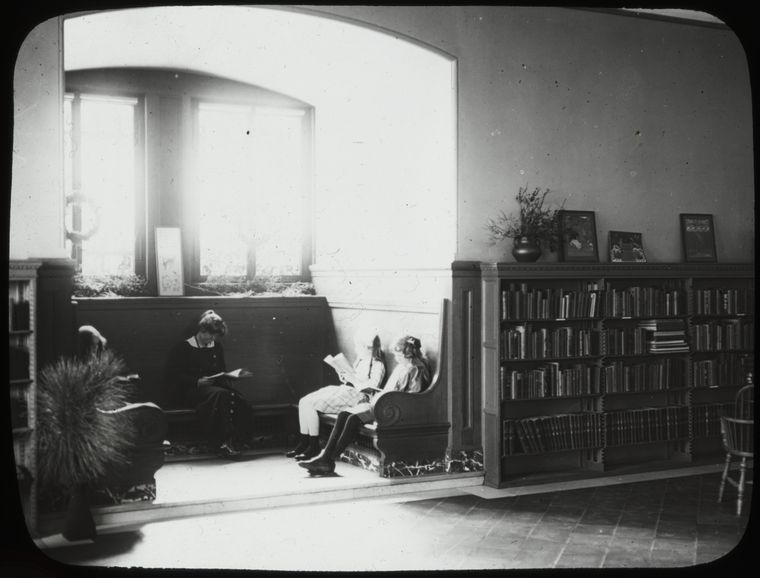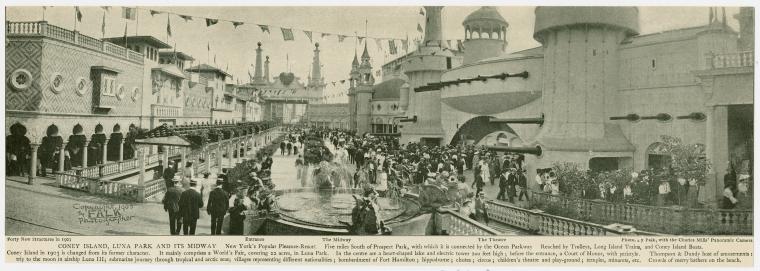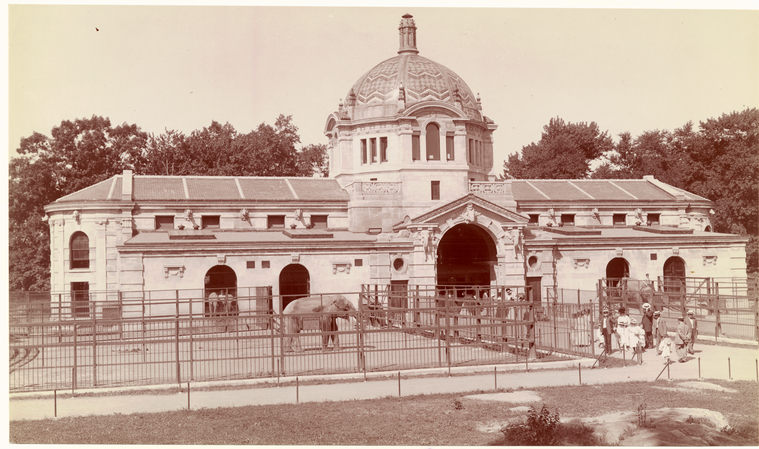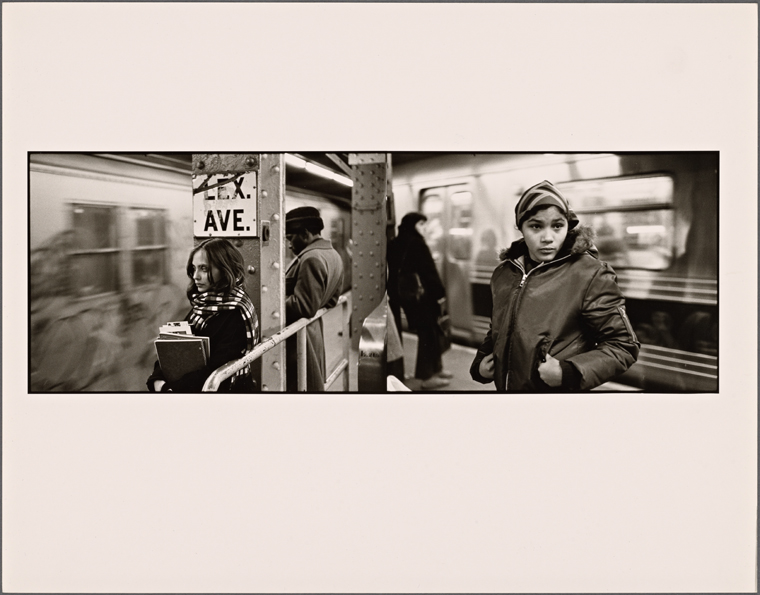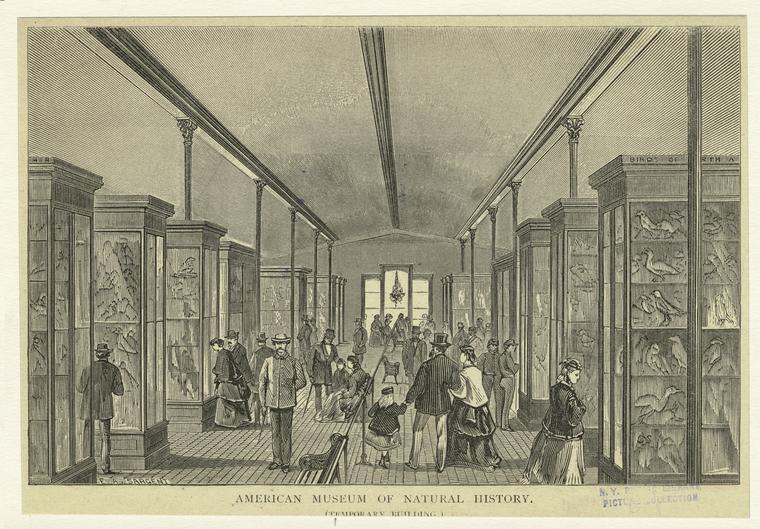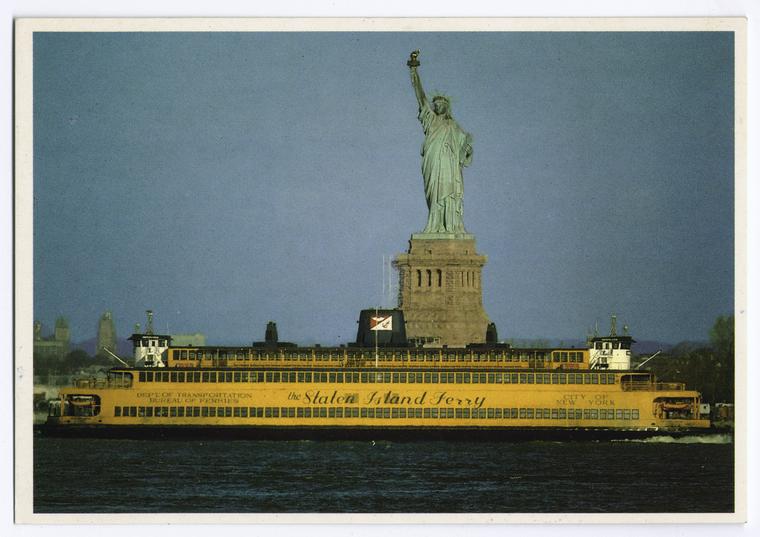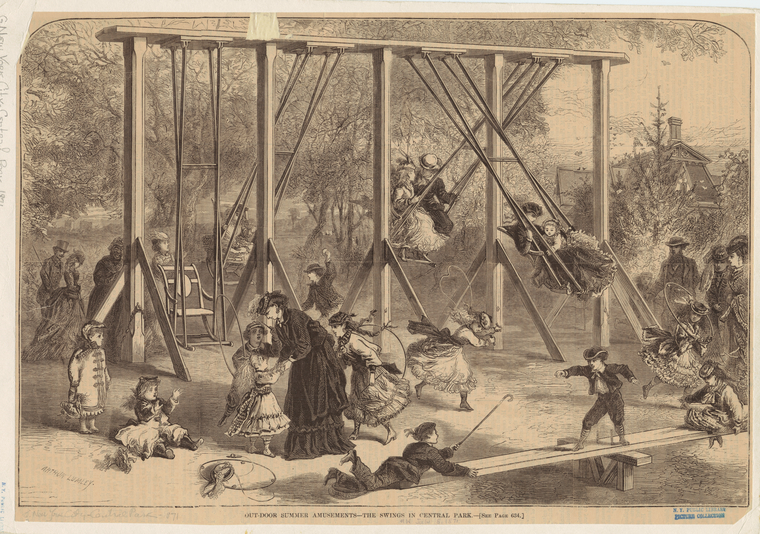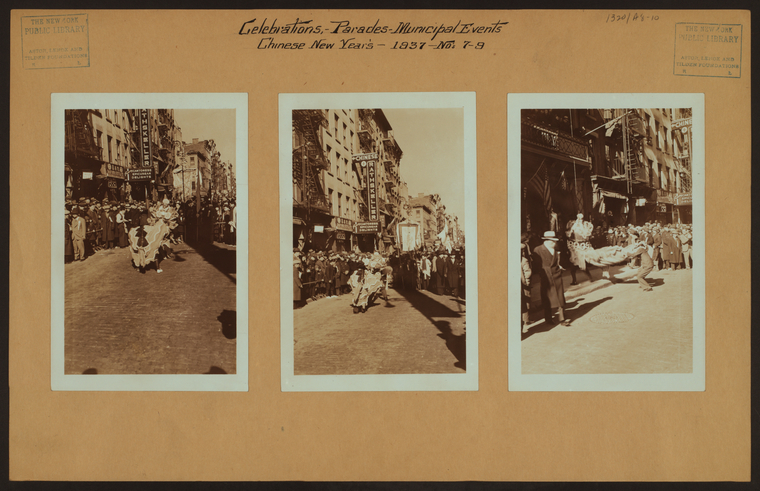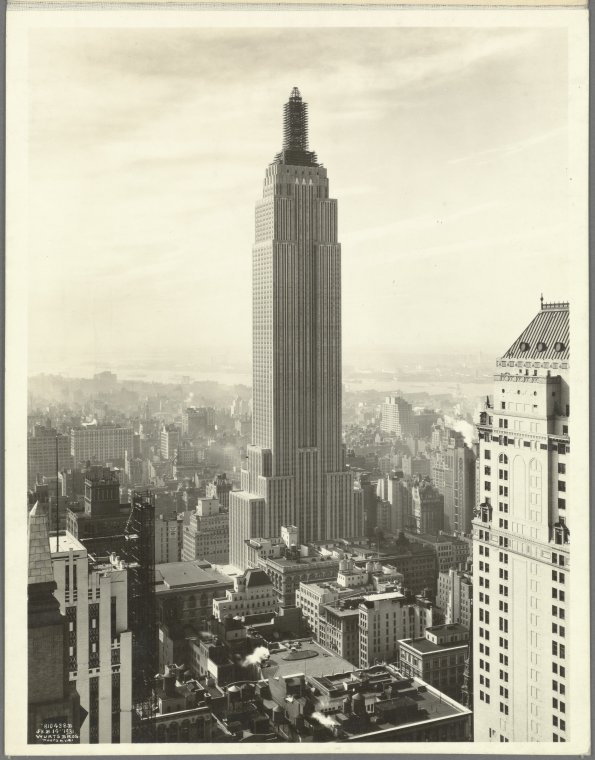Things to Do in New York City with Kids: Time Travel Edition
The Irma and Paul Milstein Division of United States History, Local History and Genealogy has long collected travel guidebooks as part of our local history collections. Guidebooks are a surprisingly rich source of materials relating to history of a place since they often extensively describe neighborhoods, cultural centers, transit options, and other city landmarks. However, most guidebooks were not aimed toward the visiting or resident families until relatively recently. The earliest in our collections is from the 1940s, with the guidebooks for families becoming common around the 1960s and later.
So what activities for people with children in New York were recommended for visitors and residents in the past? Let’s look at both things you can no longer do as well as classic activities that families can still enjoy today.
Things you can no longer do
Places that no longer exist, activities that are prohibited or restricted now, or are no longer novelties:
Planespotting at LaGuardia or JFK
Several of the older guidebooks suggest gathering your kids and heading out to the airport to watch the aircraft arrive and depart. Planespotting is still a hobby for avid aerospace enthusiasts, but not quite the tourist attraction that it once was when airports were more accessible and open to casual visitors who might stop by to dine in an airport restaurant without a boarding pass or to watch for the newest models of aircraft from an observation desk.
“For a quick and relaxing over-all view of things, you can climb into a “flightseer,” a miniature locomotive that tours the landing strips, hangars, arrival gates, etc.” (6)
“I doubt that I shall ever be so old and blase that the sight of an airport, planes arriving and departing with awesome frequency, will cease to be exciting for me. This is a wonderful world for children to wander about in.” (2)
“The size of Idlewild airport is incredible. It covers an area equal to all of Manhattan from 42nd Street to the Battery… The jets are especially spectacular with their tails of smoke.” (7) Also cited in (4), (5), (1).
Catch a baseball game at Ebbets Field or the Polo Grounds
These were the homes of the Brooklyn Dodgers and the New York Giants, respectively. Both teams departed for California in the 1950s. Now, if you want to catch a baseball game, you have the options of Yankee Stadium or CitiField, or one of the minor league teams such as the Brooklyn Cyclones or Staten Island Yankees.
“Baseball grew in popularity, whether you preferred to play it yourself or watch others play. Professional teams were organized, and the three great ball parks were built: the Yankee Stadium, the Polo Grounds, and Ebbets Field. Now things have changed and teams have moved on.” (7) Also cited in (5).
Shooting galleries at Times Square
Arcades for recreational shooting featuring mostly air guns were an attraction in Times Square.
“Endless diversion, especially for the young male.” (5)
“For years there were only theaters and movie houses around Times Square. Now you can go to the Flea Circus, play Fascination, poke around the peanut store, buy a hat with your name on it, or send a live turtle to a friend. Here go all the dimes and nickles… Shoot the bear...hit a moving duck? Watch your score mount on the indicator!” (7)
Be in the audience for a radio show
Several radio stations that allow audience members, including flagship WJZ (The American Broadcasting Station, a.k.a. ABC which still has studios at 30 Rockefeller Plaza) and WNYC, which still produces public radio, though usually not for a studio audience. Some of these station have since translated into television studios and do still host studio audiences for broadcasts. (5) (1)
Lunch at the automat
Children were particularly fond of automats, the restaurants where they could make their lunch selection with a couple of coins and withdraw their meals from tiny windows to be replenished by a mostly invisible staff.
“What a nickel does, and buys, is always fun” (5)
Ride on the tops of the double decker Fifth Avenue buses
Double decker buses disappeared in 1953, made a brief comeback in the 1970s and almost came back in 2008, but are still not part of our Fifth Ave landscape any longer.
“A fine vantage point from which to see some of the contrasting sections of the city.” (5)
“Ever since the pleasant double-deckers were scrapped, it’s been almost impossible to ride in a city bus without regretting it.” (6)
Fort Wadsworth Military Museum
Like many other places on this list, it has morphed instead of disappearing altogether. The Staten Island military installation closed in 1994. Military enthusiasts can visit the NY State Military Museum in Saratoga Springs and visitors to Staten Island can enjoy the sweeping harbor views on the grounds of Fort Wadsworth which is now operated by the Park Service. (4)
Chase Manhattan Bank Money Museum
The Money Museum was open from 1928-1977 in Rockefeller Center. Its collection even included wampum, ancient Babylonia currency, wooden nickels, and United Nations money amongst its 75,000 artifacts. The Smithsonian absorbed most of the collections of this museum.
“Some of [the money] looks pretty strange: stone money from Yap, soap from Mexico, silk from China, and pulverized wood from the Congo.” “If you aren’t already a coin collector, this will probably make you one.” (7) Also cited in (4) (1) (6).
FAO Schwartz Flagship Store
The Flagship Store may possibly return to NYC in a new location. But will it have a giant piano that you can dance a tune upon?
“Children are permitted—indeed they are encouraged—to play with the toys at Schwarz’s fabulous store” (7)
“It’s a tossup as to who becomes more excited, children or grownups, by the wondrous wares found throughout this store. No need to debate the point. Everyone ought to come here.” (2) Also cited in (3).
The New York Doll Hospital
The New York Doll Hospital operated from 1900 until 2009, finally closing when “chief surgeon” Irving D. Chais passed away after running his family business for 45 years, which he bought from a relative. “We’ve been in business since 1900,” Mr. Chais told The New York Times in 1990, “and never lost a patient yet.” The Secaucus Doll Hospital in New Jersey is operated by a protege of Mr. Chais.
“The time to hurry here is when your daughter’s favorite doll is in ill health. Bring the victim in. She can be fitted with a new wig, have any part of her body replaced, get a new make-up job and gain an entirely new wardrobe.” (2) Also cited in (7).
Office of Civil Defense on Lexington Avenue
One Cold War era guidebook suggests stopping by the office of Civil Defense at 661 Lexington Ave because “This is a good place to teach children something about: (a) the horror of atomic war; (b) what can be done to survive one (if possible) if it breaks out. The horror is summed up eloquently in a map that shows the zone of destruction that would result from a one-megaton bomb exploding above LaGuardia field. “ Exhibits demonstrated “radioactive peril”, first aid, firefighting, and survival literature. Nuclear warfare preoccupied even travel plans at the time. (6) Currently, shops occupy the ground floor of 661 Lexington.
See some history at Freedomland
Freedomland was an American history themed amusement park in the Bronx that operated only from 1960-1964. One of its main attractions was “little Old New York” designed to recreate elements of the late 19th century in NYC. Ironically, one guidebook described the theme park as having “an air of authenticity and permanence, and it is impressive.” (6)
“At Freedomland the country’s exciting past is crammed into 85 acres of space… Take a ride on the Santa Fe Railroad as it was in the 1880s… Help put out the Chicago Fire, or watch the pony express start off? … By the end of the day you may be tired, but you will have a livelier idea of United States history and you will have seen something new and different in New York.” (7).
Things you can still do
Classic activities that parents and teachers have been doing with kids for years:
New York Public Library Children’s Room
The truth is, that the Main Library (now called the Stephen A Schwarzman Building) lost its children’s room for many years, but it is back in the building now. Many of the old guidebooks feature it and tell about the story hours and historical collection of books. Nowadays, story time is still popular and kids love the displays such as those featuring the toys that inspired the authors of Winnie the Pooh and Mary Poppins.
“Including the largest collection of juvenile books in foreign languages” (2) Also cited in (1).
A Day at Coney Island
The boardwalk still provides a “fine walk and a view of, as well as refuge from, the crowded beach” (5) and the famed amusement park and the New York Aquarium.
“The best amusement area of them all. At least once in a child’s lifetime he should ride the cyclone...eat cotton candy...stop in at Nathan’s for a hot dog…” (6)
“It’s crowded and dirty and people with many undesirable characters, but children edit out the sordid aspects, see only the ‘glamour’: lights and rides and noise and lots of it. At least once in the life of the New York City child, you will have to take him here.” (2)
“There is something in this big, noisy, exciting place for everybody.” (7) Also cited in (1).
See the animals at the Bronx Zoo
The Bronx Zoo is one of the world’s oldest metropolitan zoos, it opened in 1899, and still ranks as one of the largest at 265 acres. It’s notable that NYC has a zoo in each borough, though one source says though that they can’t “compete with the Bronx Zoo in scope, ambience, or ingenuity.” (3) Also cited in (1) (7).
Brooklyn Children’s Museum
It’s one of the world’s oldest museums devoted to children’s interests, founded in 1899.
“Children work at and use this museum and adults stay out” (6)
“One of the most fascinating places to take a child” (2) Also cited in (1) (3).
Metropolitan Museum of Art
In the past the Met ran a program called Junior Museum, now families have access to lots of programs under #metkids and even print a special map for children to explore the museum. (1) (3).
Museum of the City of New York
In particular, kids have loved the toy collection for many years. “This place seems to have been created to provide material for a child’s dreams” (6).
“A must for all children (and a great treat for all ages) is this Museum, devoted exclusively to the life, history and culture of New York City.” (2) Also cited in (1), (3), (7).
Brooklyn Museum
The Brooklyn Museum on Eastern Parkway offers robust programming for youth and families and kids are often extra fond of the Asian and African art collections.
“Almost any child above the age of five is bound to be charmed by at least something in the Brooklyn Museum.” (6)
“To begin with, it is very definitely a family museum. Strollers, carriages are allowed throughout and visitors of all ages are made to feel welcome.” (2) Also cited in (1) (7).
Ride the Subway
This everyday activity is often very fun even for city kids who live here. Books such as Subway, Subway, Subway Ride, and Count on the Subway are ever popular with the preschool crowd. The New York Transit Museum, open since 1976, is very popular with families. But for a younger child, few things are better than riding the train out on the elevated tracks and watching the vast city go by. Spot the Statue of Liberty on the F or G trains, enjoy the view on the ride out to Coney Island or off the 7 train on your way to CitiField, or ride the B D N or Q trains across the Manhattan Bridge for a spectacular view of the Brooklyn Bridge and the harbor.
Parking is impractical in most of the city, so ride the subway. Sound advice that is still true: “stay off during weekday rush hours 7-9:30 am and 4-6 pm” as “it is an absolute torture, especially for children, who must feel as if they are lost in a forest of knobby knees.” (6)
“The subway is a quick and handy way to travel around the city, particularly if you don’t have to use it during rush hours.”
“Very few cities have subways, so most visitors want to take at least one trip this way.” (7)
American Museum of Natural History
The Dinosaur Hall in the Natural History Museum in particular has been thrilling kids for decades. (1) “By now hundreds of thousands of New Yorkers who were raised themselves on this wonderful place are taking their grandchildren here too. The standard exhibits seem to remain the same; yet the intellectual wonder and excitement never ceases.” “The painstaking taxidermy here is the best in town.” (6)
“There is no limit to the number of trips you will want to make here. Children of all ages find it a fascinating place.” (2)
“Who would think just bones could be so interesting?” (7)
Christmas in New York
Rockefeller Center is still one of the main stops in December, along with the city’s famous department store window displays at Macy’s, Lord & Taylor, etc. And don’t forget the Radio City Christmas Spectacular, still going strong.
“The glittering reindeer and the beautiful tree with its many colored ornaments make a thrilling sight.” (7) Also cited in (1), (3), (4).
The Staten Island Ferry
For years people have been taking this ferry just for the grand view of the harbor.
“The handsomest form of entertainment the city offers, and the cheapest.” (5)
“Superlatives only for these rides. They are the cheapest, coolest, and best in the city—and the most fun!” (6) Also cited in (1).
Central Park
Visit the Central Park Zoo, take a rowboat on the lake, ice skate at Wollman rink, ride the Central Park Carousel, as kids have been doing for years. (1) Ride the Carousel, climb the Alice in Wonderland Statue, fly a kite in the Sheep Meadow. “There is hardly a weekend when you would not do well to come here.” (2)
The Central Park website currently lists twenty-one playgrounds, including the Wild West Playground, the Ancient Playground near the Met, the Diana Ross Playground, the Adventure Playground, the toddler oriented Tarr-Coyne Playground, and Heckscher Playground which is the largest in Central Park.
“Most statues are for looking. Alice in Wonderland is for climbing. This is such a popular idea that Alice is hardly ever alone.” (7)
Chinese New Year in Chinatown
Have a dim sum lunch (3)—these days you are no longer limited to a singular Chinatown since the festivities and restaurants are also available in other parts of the city, notably Flushing Queens and Sunset Park, Brooklyn.
“Streets crackle with the sound of firecrackers, dragons abound, and everyone parades in festive mood. If you like crowds and your youngsters are past the carriage stage and know how to stay close in tight quarters, come here for an exciting day.” (2)
“All the buildings are gaily decorated… Masked figures waving fans fight or tease the dragons to the sound of weird music. The place is crowded.” (7) Also cited in (4).
Brooklyn Botanic Garden
Especially the Children’s Garden, programming for kids since 1914. (3) See the springtime cherry blossom blooms and the Sakura Matsuri festival to celebrate them. (4)
Museum of the American Indian
The Museum of the American Indian has moved from uptown to downtown in the old guidebooks versus the new ones, but it is still a top destination for families. (1) (3) (4) (7)
Street of Ships
At the South Street Seaport Museum Street of Ships families can reconnoitre the 19th century waterfront atmosphere and explore the vintage ships. (3) (4)
Cruise on the Circle Line
Viewing New York’s skyline from the water is a treat, and families can spot all landmarks in all five boroughs including Lady Liberty, Yankee Stadium, the George Washington bridge, the United Nations, and all of the city’s famous tall buildings.
In 1963, a child’s ticket on the Circle Line Cruises was only $1.25. (1)
“Children from about age four up—and the boat is full of them, plus infants and toddlers—will enjoy the ride.” (2) Also cited in (3) (7)
Empire State Building Observation Deck
Still a top attraction, along with the views from Top of the Rock and the newly opened One World Observatory. Solid advice that is still true: avoid cloudy days and try to go on a weekday early in the morning (6). Also cited in (7).
Statue of Liberty
Some are satisfied with a view from the harbor while many love to explore the grounds or climb the steps inside the statue. Now visitors can add on a trip to the Ellis Island Immigration Museum, which is part of the the Statue of Liberty National Monument.
In 1961, the round trip cost was 75 cents for adults and 35 cents for children (6).
“A day here can inspire even those of us who take the city and the nation for granted.” (2) Also cited in (7)
Recent Guidebooks
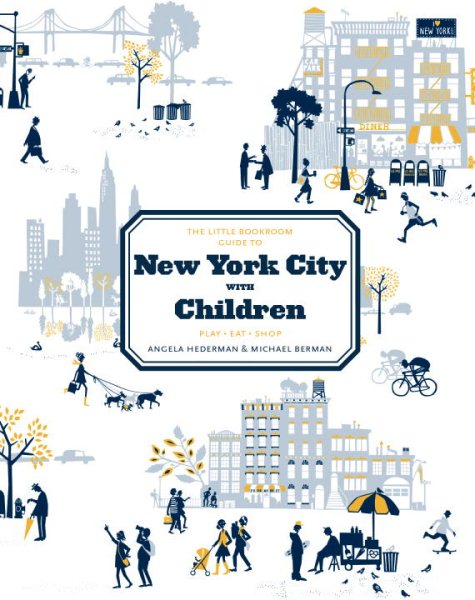
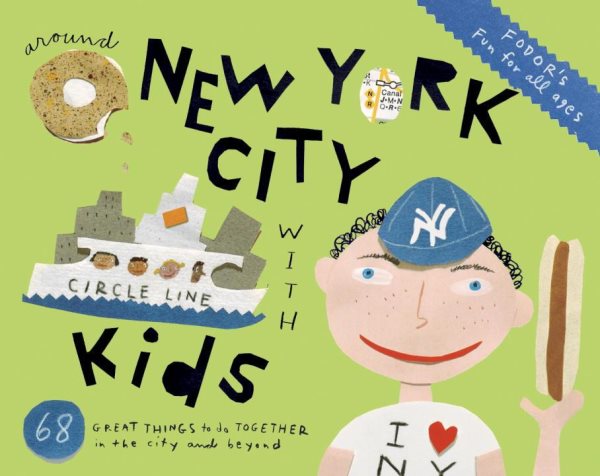
Explore these contemporary guidebooks for more ideas.
- Around New York City With Kids by Paul Eisenberg.
- Family Guide New York City by Eleanor Berman, Lee Magill, AnneLise Sorensen
- Frommer's New York City With Kids by Alexis Lipsitz Flippin.
- The Kid's Guide To New York City by Eilenn Ogintz.
- The Little Bookroom Guide To New York City With Children: Play, Eat, Shop by Angela Hederman, Michael Berman.
- Metro New York: Hundreds Of Ideas For Day Trips With The Kids by Mary Lynn Blanks.
- Outdoors With Kids New York City: 100 Fun Places To Explore In And Around The City by Cheryl and William de Jong-Lambert.
Old Guidebooks
The sources for this article:
- Away We Go! A Guidebook Of Family Trips And Places Of Interest In New Jersey, Nearby Pennsylvania And New York. Edited by Michaela M. Mole. Photos. by William F. Augustine.
- A Great City For Kids; Parent's Guide To A Child's New York. Illus. by Shelly Sacks.
- A Kids' New York by Peter D. Lawrence.
- New York For Children; An Unusual Guide For Parents, Teachers, And Tourists. illus. by Michael Meyerowitz.
- New York! New York! A Knickerbocker Holiday For You And Your Children by Ruth Mcaneny Loud and Agnes Adams Wales, Illustrated By Eileen Evans.
- Where Shall We Take The Kids? A Parent's And Teacher's Guide To New York City by Murray Polner and Arthur Barron.
- Young Folks' New York, by Suzanne Szasz and Susan Lyman.
More old guidebooks to explore:
- The Candy Apple: New York With Kids by Bubbles Fisher.
- How To Survive In New York With Children. Illustrated by Isadore Seltzer.
- New York On The Family Plan.
Read E-Books with SimplyE
 With your library card, it's easier than ever to choose from more than 300,000 e-books on SimplyE, The New York Public Library's free e-reader app. Gain access to digital resources for all ages, including e-books, audiobooks, databases, and more.
With your library card, it's easier than ever to choose from more than 300,000 e-books on SimplyE, The New York Public Library's free e-reader app. Gain access to digital resources for all ages, including e-books, audiobooks, databases, and more.
If you don’t have an NYPL library card, New York State residents can apply for a digital card online or through SimplyE (available on the App Store or Google Play).
Need more help? Read our guide to using SimplyE.
